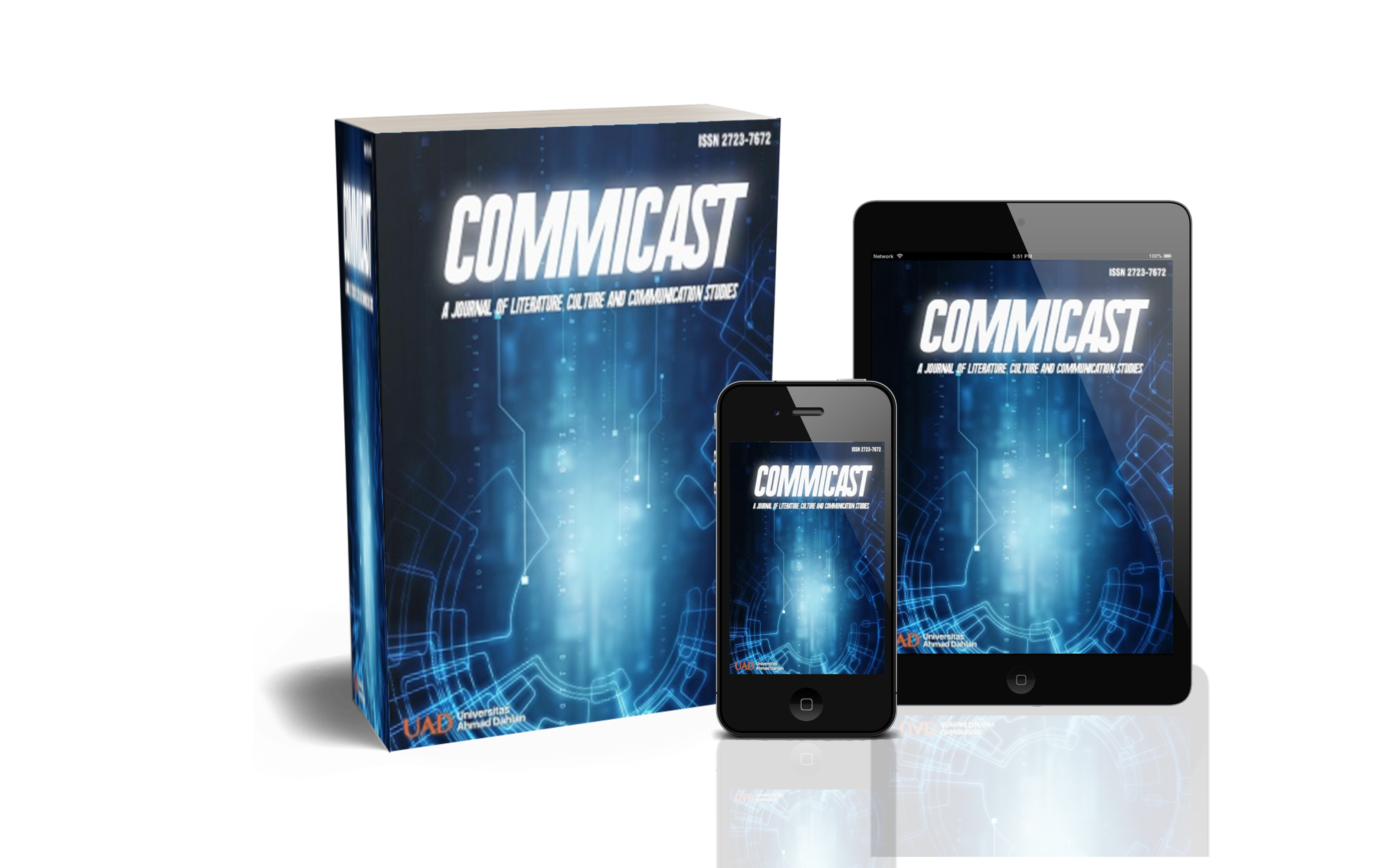Winnie’s personality in Natalie Babbit’s tuck everlasting a scientific publication
DOI:
https://doi.org/10.12928/commicast.v1i2.2729Abstract
This research is entitled†Winnie’s Personality In Natalie Babbit’s Tuck Everlasting.†The object of this study is to see the personalities of the character in the novel. This research is based on the awareness psychological approach to the type study and laws of psychology are applied to literary works. In this research, the researcher applied psychological approach and Individual psychological theory. Through the objective approach the researcher see the personalities of the character in the novel. The method of the research is descriptive qualitative method. The main data are taken from words, phrases, and sentences of the novel. The supporting data are taken from some books, articles, and internet. The results of this study are clearly explained as follows. The researcher found six personalities in the novel: fictional finalism, social interest, inferiority feeling, striving superiority, style of life, and creative power. From the six analysis of Adler’s individual psychological is connected to each other and builds a unity from the main character’s personality.References
Babbit, S. E., & Roemer, M. (1997). Telling Stories: Postmodernism and the Invalidation of Traditional Narrative. The Journal of Aesthetics and Art Criticism. https://doi.org/10.2307/431809
Feist, G. J. (2006). The psychology of science and the origins of the scientific mind. In The Psychology of Science and the Origins of the Scientific Mind. https://doi.org/10.5860/choice.44-0270
Jandevi, U. (2019). Communication strategy to improve women’s political participation in Indonesia. International Journal of Communication and Society, 1(2), 68–81. https://doi.org/10.31763/ijcs.v1i2.46
Klarer, M. (2013). An introduction to literary studies. In An Introduction to Literary Studies. https://doi.org/10.4324/9780203068915
Lachney, M., Babbit, W., & Eglash, R. (2016). Software Design in the “ Construction Genre †of Learning Technology : Content Aware versus Content. Computational Culture.
Rijali, A. (2019). ANALISIS DATA KUALITATIF. Alhadharah: Jurnal Ilmu Dakwah. https://doi.org/10.18592/alhadharah.v17i33.2374
Sindelar, J. J., & Milkowski, A. L. (2012). Human safety controversies surrounding nitrate and nitrite in the diet. Nitric Oxide - Biology and Chemistry. https://doi.org/10.1016/j.niox.2012.03.011
Ulfah, M., & Barry, A. (2019). Indonesia Leader Forum, post-truth and political interests in social media and television. International Journal of Communication and Society, 1(1), 17–25. https://doi.org/10.31763/ijcs.v1i1.18
Downloads
Published
How to Cite
Issue
Section
License
License and Copyright Agreement
In submitting the manuscript to the journal, the authors certify that:
- They are authorized by their co-authors to enter into these arrangements.
- The work described has not been formally published before, except in the form of an abstract or as part of a published lecture, review, thesis, or overlay journal. Please also carefully read Commicast's Posting Your Article Policy at http://journal2.uad.ac.id/index.php/commicast/about/editorialPolicies#custom-5
- That it is not under consideration for publication elsewhere,
- That its publication has been approved by all the author(s) and by the responsible authorities – tacitly or explicitly – of the institutes where the work has been carried out.
- They secure the right to reproduce any material that has already been published or copyrighted elsewhere.
- They agree to the following license and copyright agreement.
Copyright
Authors who publish with Commicast agree to the following terms:
- Authors retain copyright and grant the journal right of first publication with the work simultaneously licensed under a Creative Commons Attribution License (CC BY-SA 4.0) that allows others to share the work with an acknowledgment of the work's authorship and initial publication in this journal.Â
- Authors are able to enter into separate, additional contractual arrangements for the non-exclusive distribution of the journal's published version of the work (e.g., post it to an institutional repository or publish it in a book), with an acknowledgment of its initial publication in this journal.
- Authors are permitted and encouraged to post their work online (e.g., in institutional repositories or on their website) prior to and during the submission process, as it can lead to productive exchanges, as well as earlier and greater citation of published work.
Licensing for Data Publication
Commicast use a variety of waivers and licenses, that are specifically designed for and appropriate for the treatment of data:
Open Data Commons Attribution License, http://www.opendatacommons.org/licenses/by/1.0/ (default)
Creative Commons CC-Zero Waiver, http://creativecommons.org/publicdomain/zero/1.0/
Open Data Commons Public Domain Dedication and Licence, http://www.opendatacommons.org/licenses/pddl/1-0/
Other data publishing licenses may be allowed as exceptions (subject to approval by the editor on a case-by-case basis) and should be justified with a written statement from the author, which will be published with the article.
Open Data and Software Publishing and Sharing
The journal strives to maximize the replicability of the research published in it. Authors are thus required to share all data, code or protocols underlying the research reported in their articles. Exceptions are permitted but have to be justified in a written public statement accompanying the article.
Datasets and software should be deposited and permanently archived inappropriate, trusted, general, or domain-specific repositories (please consult http://service.re3data.org and/or software repositories such as GitHub, GitLab, Bioinformatics.org, or equivalent). The associated persistent identifiers (e.g. DOI, or others) of the dataset(s) must be included in the data or software resources section of the article. Reference(s) to datasets and software should also be included in the reference list of the article with DOIs (where available). Where no domain-specific data repository exists, authors should deposit their datasets in a general repository such as ZENODO, Dryad, Dataverse, or others.
Small data may also be published as data files or packages supplementary to a research article, however, the authors should prefer in all cases a deposition in data repositories.























